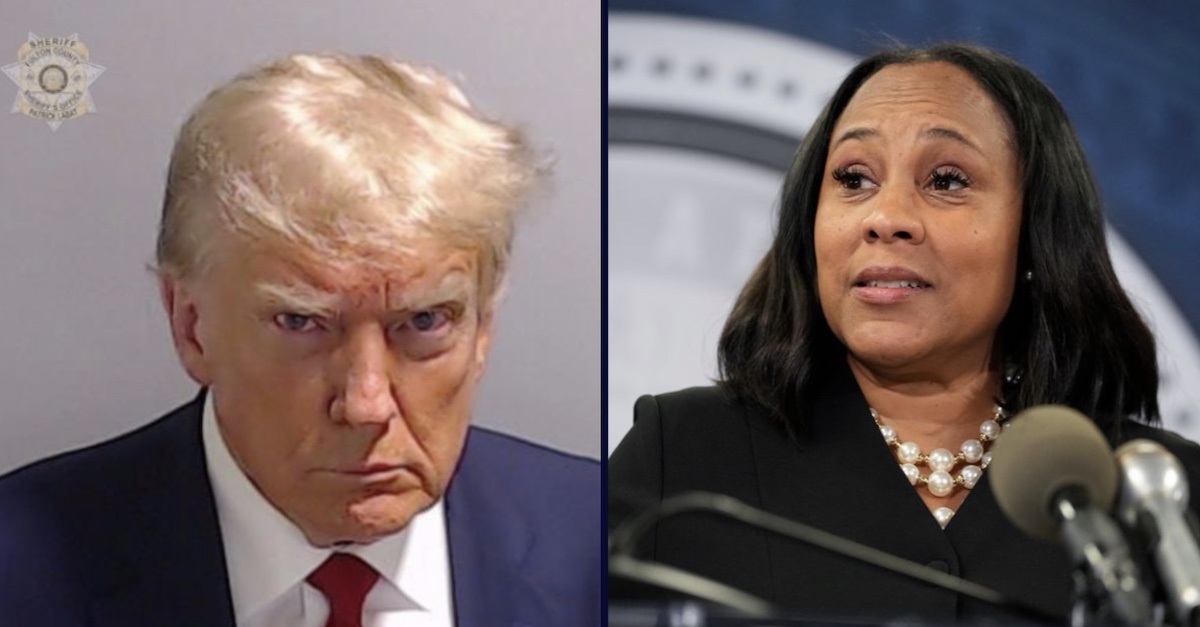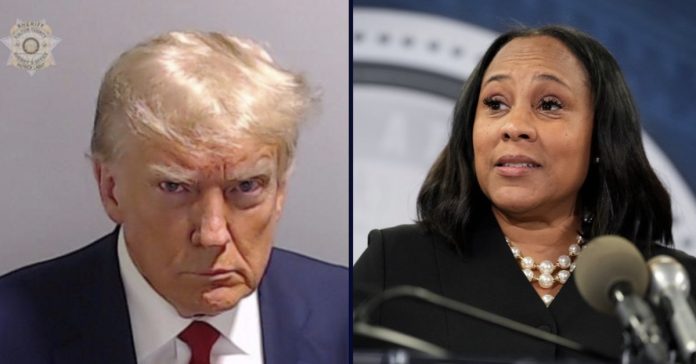
Donald Trump’s Fulton County jail mug shot, Fulton County DA Fani Willis (AP Photo/John Bazemore, File)
Fulton County District Attorney Fani Willis has asked a judge to ignore a recent court filing purporting to show a series of cellphone “interactions” between herself and the special prosecutor overseeing the racketeering (RICO) case against former President Donald Trump.
Early on Friday, Trump attorney Steven Sadow filed a supplemental exhibit allegedly based on an analysis of cellphone records indicating that special prosecutor Nathan Wade was in physical proximity to Willis before the time in 2021 when he was hired to work on the case — well before Willis and Wade have testified their relationship began.
Later on Friday, Willis sought to rubbish that filing as in violation of the court’s standing order on how evidence will be admitted in the case, the Georgia rules of evidence, and U.S. Supreme Court precedent.
“The Court’s Standing Case Management Order for Criminal cases was specifically intended to prevent parties from ambushing opposing counsel with purported expert evidence without allowing opposing counsel a meaningful opportunity to review the evidence, review the purported expert’s report and qualifications, and obtain its own expert in rebuttal,” the state’s objection reads. “The Court cannot now allow Defendant Trump to bypass this protective procedure when, in other cases, it has excluded expert evidence for a party’s failure to follow the Standing Case Management Order for Criminal Cases.”
In the Trump filing, investigator Charles Mittelstadt argues that AT&T records “revealed over 2000 voice calls” and “just under 12,000 interactions” exchanged by Wade and Willis over 11 months in 2021.
The investigator hired by Trump’s defense attorney also claims the data shows “specialized location data” for Wade’s cellphone number which puts him near Willis’ address on two days — during the early morning hours — in September and November 2021.
On Nov. 1, 2021, Wade was hired to work the RICO case. Both Willis and Wade, however, have testified (and averred in court documents) that their relationship did not become romantic until 2022.
Defense attorneys led by those representing co-defendant Michael Roman, a former Trump 2020 staffer, have alleged that Willis appointed Wade and then reaped something of a financial windfall in the form of various destination vacations, gift-like dinners and excursions during those trips, and other purchases. The prosecutors, conversely, say they more or less split their travel expenses equally.
There is a very scant — admittedly almost nonexistent — paper trail to substantiate the state’s claims that Willis reimbursed Wade. But, the basic facts of the relationship and when it began are also key to the judge’s ultimate determination over whether or not the DA, along with her entire office and prosecutorial team, will be tossed from the case.
“Mittelstadt, the author of Exhibit 38, is available to testify at the Court’s convenience,” the Trump filing reads — an attempt to piggyback on recent hearings over the Wade-Willis relationship.
The district attorney’s office, in their objection, disputes what Mittelstadt suggests: that Wade was calling on Willis late at night.
A bolded and underlined section in the latest filing reads:
The records do not prove, in any way, the content of the communications between Special Prosecutor Wade and District Attorney Willis; they do not prove that Special Prosecutor Wade was ever at any particular location or address; they do not prove that Special Prosecutor Wade and District Attorney Willis were ever in the same place during any of the times listed in Supplemental Exhibit 38; and, in fact, on multiple relevant dates and times, evidence clearly demonstrates that District Attorney Willis was elsewhere, including at work at the Fulton County District Attorney’s Office AND VISTING [sic] THE THREE CRIME SCENES WHERE A MASS MURDER MOTIVATED BY RACE AND GENDER BIAS HAD TAKEN PLACE.
Willis has previously called the effort to remove her from the case “absurd” and said that it reflects a “basic misunderstanding” of “rudimentary” rules. Still, Fulton County Superior Court Judge Scott McAfee has said the issues raised by the defense are serious and could warrant disqualification.
The state’s late Friday salvo largely sticks to the evidentiary issues — arguing Trump’s filing cannot satisfy numerous obligations under the court’s, the state’s, and the constitution’s procedural rules for the admission of evidence. Willis argues the judge should not consider the Mittelstadt data when ruling on the motion to disqualify.
Tucked into the tail-end of the state’s objection is also a quick bit of musing about where the Wade cellphone data came from.
“Moreover, the State questions whether Defendant Trump legally obtained cell site location information, which is generally only obtainable after a finding of probable cause and issuance of a search warrant,” the district attorney’s office writes.
Have a tip we should know? [email protected]

